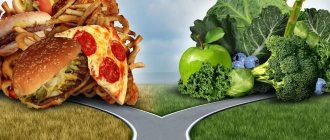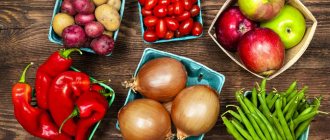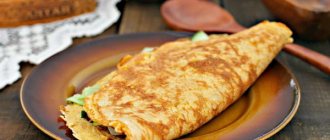In this article:
- The importance of proper nutrition
- 10 basic principles of proper nutrition
- Composition of the diet with proper nutrition
- Recommended foods for proper nutrition
- Foods to Avoid
- 3 tips for selecting and consuming products
- Sample weekly menu for men
- Sample weekly menu for women
- Calorie content of food
When talking about proper nutrition, you should not mean various diets for weight loss or special menus for athletes. It should be about food that is healthy. It would seem that nothing could be simpler: exclude all harmful foods from your diet and lean on healthy ones. However, not all so simple.
It’s not enough to give up snacking on the go, addiction to fast food and alcohol abuse. You need to follow a certain diet, monitor the balance of substances entering the body, and sometimes even count calories. Yes, it's not easy. But the result will be one you can only dream of.
The importance of proper nutrition
Everything that the human body needs for life comes into it along with food and water. Quality life indicators such as a person’s health status, physical and emotional activity, ability to work, and life expectancy depend on the composition and properties of the food consumed. Perhaps no other factors are as important for the body.
Experts say that 50% of it is lifestyle (and with it nutrition, the products consumed) that influences a person’s physical condition. Another 20% depend on hereditary factors and living conditions. And only 10% remains on this list for the quality of medical care.
It is proper and healthy nutrition that allows the body to function normally. With food, a person receives the energy necessary for life. Due to the beneficial substances supplied with food, new cells are built, tissues and organs are renewed. Lack of food or its excess is always harmful, both for young and old people.
What does this mean? Physical and mental development is inhibited, a person quickly gets tired, feels general weakness, is unable to work normally and resist external negative influences.
The transition to the principles of proper nutrition is vital for those who:
- feels that it’s time to get rid of extra pounds;
- chooses a healthy lifestyle (healthy lifestyle system);
- loves sports and takes care of his physical fitness;
- understands that poor nutrition is the cause of many diseases;
- is no longer completely healthy (heart disease, digestive problems, etc.) precisely because of poor nutrition, and therefore you have to stick to a diet;
- tries to instill proper nutritional culture in her family.
Practice shows that most often people remember proper nutrition specifically for weight loss. Overweight is observed in 54% of Russian men and 59% of women, these are the statistics. And in most cases, the problem is precisely that people are accustomed to poor nutrition and lifestyle. They consume a lot of high-calorie foods and exercise little. What is the result? Not only does a fat person not look very attractive, he also feels bad, because all organs have to withstand increased stress.
As for the very essence of proper nutrition, there are quite a lot of different opinions about this, as well as those aspects that should be taken into account. Below we will outline general principles that almost anyone can follow, although, of course, there are always exceptions to the rules. Some people may have to give up some foods completely. After some time, with experience, you will understand which diet is optimal for you.
How to cook the right food
Here we get a lot of advantages. Eating healthy is quick, easy and economical.
Saving
Many people think that natural products are more expensive than semi-finished products, but in fact this is not the case.
Natural meat is needed much less than dumplings, sausages and sausages. Fruits and vegetables are expensive, yes, but if you choose local seasonal apples, pears and cucumbers, it will be cheaper than buying bananas, kiwis and “plastic” tomatoes of unknown origin.
You can argue on this topic endlessly, but I buy food myself, and therefore in practice I have become convinced that the correct diet is much cheaper than the incorrect one.
Speed
As soon as we don’t get perverted when cooking in the kitchen, when we don’t control calories. We stew meat for hours, prepare rich broths, use dozens of products for mayonnaise-based multi-layer salads, close jars of homemade pickles - all this takes a lot of time.
The main thing in proper nutrition is a minimum of heat treatment. Because we know that heat treatment of foods leads to an increase in the glycemic index, oxidation and release of harmful elements.
For example, chicken is cooked for 15 minutes, breast steak in a dry non-stick frying pan for 10 minutes, buckwheat porridge, bulgur, quinoa for 10-15 minutes, the right salad for 5 minutes, and I cook breakfast in 5 minutes.
Simplicity and convenience
I prepare food every day in the morning. It takes me about half an hour. While I’m getting ready for work, porridge and meat are being cooked, and oatmeal is being brewed for breakfast. The only thing I prepare for several days is salads, in the form of preparations, and liver pate.
I always take 2-3 plastic containers of food with me, depending on how long I plan to stay away from home. I use plastic utensils.
As a result, the advantages that I get:
- There is no need to cook anything else during the day,
- I'm always full and don't think about buying something tasty in the store,
- There is no need to spend money on cafes, fast food restaurants and snack on all sorts of rubbish,
- No need to wash dishes. Containers, by the way, cost mere pennies,
- The food is always fresh and does not cause stomach problems,
Once again, at the moment, I really like what I eat every day. For me it's delicious. On long business trips, I feel discomfort without the usual food, so I always take a packed lunch with me.
How to cook
The main principles: do not fry in refined oil, do not cook for a long time, do not use deep frying or breading, add only natural seasonings, watch the calorie content (we especially often forget about salad dressings), do not cook in the oven until golden brown, and I advise you to refuse from first courses.
Regarding borscht and soups, there is an article on my Zen channel (link here).
Now, let's move directly to the list of foods that you can eat to lose weight.
Composition of the diet with proper nutrition
The rules of nutrition for every day are quite simple: a person must receive 6 important nutrients for life with food, namely proteins, fats, carbohydrates, useful minerals, a set of essential vitamins and water. The absence of any of them will negatively affect your health. Which food products contain the beneficial substances listed above?
- Protein-Rich Foods
Protein acts as a building material for the body's cells and supplies it with amino acids. Remember, you should not overuse foods rich in protein, but its lack is also harmful. The most protein is found in meat, fish, seafood, eggs, greens, soy, and legumes. The best time to consume animal proteins is in the morning, and leave plant-based ones for the evening.
- Sources of carbohydrates
Carbohydrates provide energy and are a source of nutrition for brain cells, so you cannot do without them. Unless you can reduce your consumption if you decide to lose weight. Healthy, so-called slow carbohydrates are found in vegetables, fruits, legumes, pasta and cereals, as well as in wheat grains (but specifically in durum varieties).
- Fat-containing products
One of the conditions for proper nutrition is the obligatory consumption of fat, although many mistakenly believe that this is not so. Fats are building materials for the body, support normal thermoregulation, and give a person endurance. But they are not burned so easily because of their inertia. The approximate consumption rate for humans is 25% of vegetable fats, and 75% of animal fats. The most fats are found in meat, fish, nuts and vegetable oils.
- Sources of vitamins
Vitamins are essential for the normal functioning of many vital systems of the human body, immune, hormonal, visual organs and others. Lack of vitamins causes vitamin deficiency, which then becomes the cause of dangerous diseases. Vegetables, fruits, herbs, berries and cereal sprouts, caviar, fish oil, brewer's yeast are rich in vitamins.
- Foods High in Minerals
Minerals mean salts, salt ions and useful low-molecular substances. Even a small amount of them gives the body everything it needs for its normal functioning. For example, calcium ions are responsible for bone strength, and iron is required to maintain the required level of hemoglobin. The most minerals are found in vegetables and fruits, meat, fish and seafood, also in salt, cereals, pasta, dairy products and bread.
- An important element of proper nutrition is water.
It is vital for a person along with the beneficial substances listed above. Water helps flush out toxins, helps digestion, and normalizes thermoregulation. The recommended amount of consumption for an adult is approximately 2-2.5 liters per day, and the loss of 7% of the fluid available in the body is already critical for health.
Is it possible to gain weight from dairy products? Do dairy products make you fat? Expert opinion
Do dairy products make you fat?
Recently, more and more studies have appeared indicating that milk fats are beneficial and can even treat obesity. Olga Volkova, director of medical public relations at Danone Russia, told Milknews about the benefits of milk fats and whether low-fat products help your health. Milknews: Tell us why you used to think that any fat was harmful, but now they are claiming its benefits. What does it give? Volkova: Milk fat in moderation does not have a harmful effect on the body of a healthy person. Milk fat contains fatty acids necessary for the functioning of the human body. There is no direct connection between obesity and the consumption of dairy products; there are a number of studies that show a connection between the consumption of low-fat yogurt and weight loss. Data from a comprehensive study of the health and eating habits of the US population (NHANES 2005-2008) showed that children consuming yogurt and other dairy products has a positive effect on their weight. Experts from the Centers for Disease Control and Prevention (CDC) have concluded that including yogurt and other dairy products in a child's diet naturally leads to greater intake of calcium and vitamin D, which reduces the likelihood of obesity in children and improves the quality of nutrition. Milknews: Why are milk proteins so beneficial? What role do they play in the body's metabolic processes? Volkova: Milk protein, as a protein of animal origin, is a source of essential amino acids. Protein is the building material of our body; every cell is primarily protein. Animal protein is also necessary for the proper functioning of the immune system; it is part of the hormones that regulate the functioning of our body. Protein is a carrier of oxygen to all organs and systems. Milknews: Why are the elements contained in milk important? Volkova: First of all, dairy products are a source of calcium and complete milk protein. Calcium is necessary for the skeletal system; in addition, it is involved in the regulation of the nervous and cardiovascular systems, and affects muscle function. Calcium is not produced by our body and therefore must come from outside. Three servings of dairy products per day provides approximately 80% of your daily calcium intake. Dairy products are rich in a number of vitamins - B vitamins, vitamin A, K, and phosphorus. Milknews: More and more nutritionists are warning that there is no need to get carried away with low-fat dairy products, that products with a fat content of about 3.2-3.5% are better absorbed. Is it true? Volkova: If you do not experience health problems, then you do not need to be overly fond of low-fat dairy products. After all, milk fat, like any fat, is a source of energy. Therefore, consuming dairy products with normal fat content as part of a balanced diet and active lifestyle will not harm your health. Milknews: Which dairy products are healthier: milk, kefir, cottage cheese, cheese? Volkova: This is not a completely correct question, dairy products should be a daily component of your diet, but what product to consume is your choice. Leading nutritionists recommend consuming 3 servings of dairy products every day. This could be a glass of milk or kefir + a glass of yogurt + 100g of cottage cheese or 60g of cheese.
Recommended foods for proper nutrition
With proper nutrition, the menu must contain healthy foods every day, containing a lot of fiber, vitamins, minerals, amino acids, fatty acids, micro and macroelements. Typically these are foods that are quickly digested, promote good metabolism and are very healthy. Here is an approximate list of them:
- Berries, vegetables, fruits (fresh, rich in fiber and vitamin C).
- Cereals, including in the form of porridges (contain magnesium, potassium, folic acid, vitamins B, E).
- Dried nuts and fruits (rich in protein, vitamins, fatty acids).
- Poultry meat. It contains a lot of protein, amino acids, vitamins A, B, E.
- Various varieties of fish, seafood (sources of protein, phosphorus, calcium, polyunsaturated acids, vitamins D, E, B12).
- Fermented milk products, namely cottage cheese, sour cream, yogurt (contain a lot of calcium, protein, carbohydrates, amino acids, plus vitamins D, A, B12).
- Green tea is rich in polyphenols, as well as minerals and vitamins.
- Cold-pressed vegetable oil (they contain a lot of phospholipids, vitamins A, D, E, linoleic acid and other polyunsaturated acids).
- Bread (cereal) is rich in fiber, amino acids and enzymes.
- A very useful product is honey. It contains many vitamins and microelements, fructose, glucose, phytoncides and fast carbohydrates.
Proper healthy eating just means including the products listed above in your diet (of course, in reasonable quantities and combinations). Nutritionist advice: cereals (cooked in water) go well with vegetable salads; it is better to use olive oil as a dressing. You should not chop both tomatoes and cucumbers into one salad. The former are rich in vitamin C, and the latter, when cut, release an enzyme that has a destructive effect on this vitamin. The best addition to meat, poultry and fish are vegetables such as cabbage, zucchini, cucumbers, asparagus, and radishes. Fruits should not be combined with other foods, but it is better to consume them either before or an hour after the main meal.
A set of products for weight loss. The main rules for losing weight
The basics of proper nutrition for overweight people include eating healthy and nutritious foods that do not overload the digestive tract. Essential foods that speed up the fat burning process must contain proteins, carbohydrates and fiber. Fats of animal origin are replaced with vegetable fats, but they cannot be completely excluded from the diet.
Cereals and legumes
Legumes and cereals must be present in the diet menu. Dishes prepared using them quickly eliminate the feeling of hunger. Legumes and cereals contain complex carbohydrates, the breakdown of which the body spends energy on, thereby accelerating the process of releasing fat capsules from the subcutaneous layer. To retain all the nutritional value, crops must be cooked properly.
Fats
Fats of animal origin are contained in meat; the body cannot be completely deprived of them. Experts recommend reviewing the menu and excluding fatty meats (lamb, pork, beef). They are replaced to a greater extent by vegetable fats. Dishes with added meat should be present in the diet - they are prepared from turkey and chicken.
Fruits, vegetables, greens
The main emphasis when losing weight is on fresh products of plant origin. They contain vitamins, macro- and microelements, you can quickly get enough of them without compromising your health. The best vegetables, plant foods (list of products):
- potato;
- carrot;
- beet;
- celery;
- spinach;
- broccoli and other types of cabbage;
- sweet bell pepper;
- zucchini;
- eggplant;
- onion;
- rhubarb.
Fruits:
- avocado;
- apricots;
- pineapples;
- oranges;
- lemons;
- tangerines;
- kiwi;
- apples;
- pears.
Berries:
- watermelons;
- strawberry;
- raspberries;
- cherry plum;
- currant;
- plums
Dill, parsley, green onions and cilantro contain the optimal amount of minerals and improve the taste of dishes. They are most often consumed fresh.
Fermented milk
The main sources of protein are fermented milk and dairy products. The diet menu should include yoghurt, cheeses (feta cheese), kefir, yogurt and milk.
When purchasing, you need to pay attention to the fat content of the products - the percentage of fat content should not exceed 2.5%.
Meat, fish, seafood
Meat, fish and seafood can be eaten 1-2 times a day. Low-fat varieties of fish and meat go well with a side dish of stewed vegetables and boiled cereals. It is important to follow the basic rules for preparing dietary food - products are boiled, stewed in their own juices or steamed. Frying and deep-frying should be ignored. Vegetables and meat can be sauteed with the addition of a small amount of oil.
Foods to Avoid
If you decide to adhere to the principles of proper nutrition, then remember that there are also harmful foods that interfere with normal metabolism and contribute to the accumulation of harmful fats.
Here's what you should remove from your diet:
- alcohol;
- nuts with salt, chips, crackers, puffed corn;
- everything sweet;
- baked goods, especially with a lot of sugar;
- semi-finished products and concentrated products such as instant mashed potatoes, “quick” noodles, etc.;
- everything fried;
- sausage, smoked products;
- any factory-produced sauces (mayonnaise too);
- fast food dishes;
- soda and factory-made juices (you can drink freshly squeezed).
It would also be good to stop consuming salt and sugar. This is not so simple, but at least add a little salt to your dishes, and try replacing sugar with honey. We can recommend using sea salt or pink Himalayan salt. Firstly, due to greater saturation with useful components, and secondly, due to a smaller amount of sodium chloride.
Sample weekly menu for men
So, the menu is in accordance with the norms of proper nutrition for a week for men.
Monday:
- Breakfast: boiled egg (1 pc.), buckwheat porridge, vegetable salad, green tea.
- Second breakfast: kefir (1 glass) or banana (1 pc.).
- Lunch: meat (boiled), vegetable salad, fruit or berry compote.
- Afternoon snack: green tea, grain bread or baked goods (dietary).
- Dinner: fish (boiled or baked), vegetable salad, green tea with a spoon of honey.
Tuesday:
- Breakfast: oatmeal porridge with berries and pumpkin seeds, a glass of tea or compote.
- Second breakfast: vegetable or beet salad, bread.
- Lunch: chicken meat (boiled), buckwheat porridge, vegetable salad, tea (green).
- Afternoon snack: a piece of bread (whole grain) with cheese, compote.
- Dinner: meat (boiled), potatoes (also boiled), fresh vegetables.
Wednesday:
- Breakfast: omelet with green onions and dill, a glass of tea or compote.
- Second breakfast: any fruit or nuts.
- Lunch: cutlet (steamed), vegetable side dish, cream soup, glass of tea (green) or compote.
- Afternoon snack: cottage cheese casserole (dietary), tea.
- Dinner: a piece of fish (lean, baked or boiled), vegetable salad, compote.
Thursday:
- Breakfast: scrambled eggs or omelet with asparagus, vegetables (stewed), tea with honey.
- Second breakfast: banana (1 piece) or nuts.
- Lunch: boiled meat (low-fat), potatoes (bake or boil), vegetables (fresh), a glass of green tea or compote.
- Afternoon snack: a piece of bread (whole grain) with cheese, cottage cheese or feta cheese (add berries), a glass of tea.
- Dinner: meat (boiled) or steamed cutlet, vegetables, a glass of tea.
Friday:
- Breakfast: pearl barley porridge (with milk) with nuts.
- Second breakfast: fruits or berries.
- Lunch: lean turkey or chicken, vegetable soup, tea.
- Afternoon snack: bread, a glass of tea (green) or compote.
- Dinner: vegetable salad, fish (stewed), a glass of compote or plain water.
Saturday:
- Breakfast: oatmeal porridge, any berries or fruits, tea (can be sweet).
- Second breakfast: one grapefruit.
- Lunch: cutlet (steamed), buckwheat porridge, cream soup (vegetables), compote.
- Afternoon snack: cookies (dietary only), glass of tea.
- Dinner: a piece of meat (lean, boiled), any vegetables, a glass of green tea.
Sunday:
- Breakfast: porridge with raisins or any dried fruits, tea (can be sweet).
- Second breakfast: banana (1 pc.).
- Lunch: chicken (boiled), any side dish, tea.
- Afternoon snack: bread, a glass of milk or kefir.
- Dinner: chicken (boiled), side dish - vegetables (fresh), compote.
General principles of healthy eating
People who try to adhere to the principles of proper nutrition are interested in questions about what foods can be consumed daily, how to properly prepare and combine them. Meals should be separate and fractional - the weight of portions in this case is 250-300 g. Particular attention should be paid to the methods of preparation - salads from boiled vegetables are not seasoned with mayonnaise, but with olive oil and lemon juice.
Seasonings and spices can be added to dishes, but in small quantities. Second fish courses are steamed, vegetables can be stewed and boiled. Wheat bread is replaced with rye bread, and the consumption of confectionery products is reduced to a minimum. It is important to completely give up bad habits; drinking alcohol is unacceptable.
Separate means useful
Proteins, fats and carbohydrates must be consumed correctly; some foods do not combine with each other. When preparing healthy meals, you need to be guided by the basic principles of separate nutrition:
- starchy foods are not combined with acids - bread is not eaten with tomatoes, tangerines - with bananas;
- carbohydrates are consumed separately from proteins - mushrooms are not eaten at the same time as porridge;
- acids and proteins are consumed separately - nuts and mushrooms are not eaten with oranges;
- complex and easily digestible carbohydrates cannot be combined with each other.
Eat only one type of food high in protein at a time - bread and pasta are incompatible.
Self-discipline
Many people are interested in the answer to the question of what can be cooked while adhering to a healthy diet, and what cannot be cooked. One of the main rules of healthy eating is self-discipline. If a person decides to lead a correct lifestyle, then he must adhere to it constantly. You should not break down and abuse alcohol; prohibited dishes and foods should not be included in your diet, even with a strong desire. Experts do not recommend abruptly switching to a balanced diet; they begin to eat healthy foods gradually.
Observation and analysis
According to reviews, by adhering to proper balanced nutrition, you can get rid of up to 7-8 kg per month. At the end of each week, experts recommend arranging fasting days - they will help cleanse the body of accumulated toxins and waste. If a person pursues the goal of losing weight, then fasting is strictly prohibited. With a balanced diet, you can not only get rid of extra centimeters, but also improve the functioning of most internal organs, especially the gastrointestinal tract.
We drink a lot and correctly
Maintaining a drinking regime is considered a prerequisite for proper nutrition.
You need to drink when thirst occurs, the minimum volume of liquid consumed is no more than 2 liters, but this does not mean that all drinks can be used. Permitted include:
- compotes from dried fruits and fresh fruits without added sugar;
- herbal infusions and teas, including green;
- fruit drinks;
- jelly;
- mineral water without gas;
- fresh juices;
- kefir;
- weak coffee and black tea;
- homemade lemonade;
- drinking yogurt.
Sparkling mineral water, carbonated sweet and alcoholic drinks must be completely excluded from the menu.
Fruit juices can be mixed with vegetable juices - such fresh juices are beneficial for the body.
Table of food combinations for proper nutrition
Nutritionists recommend observing food compatibility - this will avoid digestive problems. Food compatibility table (according to Sheldon):
| Products | 1 | 2 | 3 | 4 | 5 | 6 | 7 | 8 | 9 | 10 | 11 | 12 | 13 | 14 | 15 | 16 | 17 |
| 1. Fish and meat | 0 | + | – | – | – | – | – | – | – | – | – | – | – | – | – | – | – |
| 2. Green vegetables | + | 0 | + | + | + | + | + | + | + | + | – | + | + | + | + | + | + |
| 3. Vegetables with starch | * | + | 0 | + | + | – | + | * | + | + | + | * | + | + | * | + | * |
| 4. Butter | – | + | + | 0 | – | – | + | – | * | – | * | * | – | * | – | – | + |
| 5. Vegetable oil | – | + | + | – | 0 | – | + | * | + | + | * | – | – | – | – | – | + |
| 6. Sugar | – | + | – | – | – | 0 | – | – | – | – | – | – | – | – | – | – | – |
| 7. Cereals and flour products | – | + | + | + | + | – | 0 | – | * | – | + | – | – | – | – | * | – |
| 8. Dried fruits, fruits | – | + | * | – | * | – | – | 0 | – | – | * | * | + | – | – | * | * |
| 9. Legumes | – | + | + | * | + | – | * | – | 0 | * | + | – | – | – | – | + | – |
| 10. Potatoes | – | + | + | – | + | – | – | – | * | 0 | + | – | – | * | – | – | + |
| 11. Sour cream | – | + | + | * | * | – | + | * | + | + | 0 | – | – | – | – | + | + |
| 12. Milk | – | – | * | * | – | – | – | * | – | – | – | 0 | – | – | – | – | – |
| 13. Cottage cheese | – | + | + | – | – | – | – | – | – | – | – | – | 0 | + | – | + | + |
| 14. Cheese | – | + | * | – | – | – | * | – | – | * | – | – | + | 0 | – | – | + |
| 15. Eggs | – | + | * | – | – | – | – | – | – | – | – | – | – | – | 0 | – | – |
| 16. Nuts | – | + | + | – | – | – | * | * | + | * | + | – | + | – | – | 0 | + |
| 17. Mushrooms | – | + | * | + | + | – | – | * | – | – | + | – | * | + | – | + | 0 |
Table symbols: (-) – negative compatibility, (+) – positive compatibility, (*) – relative compatibility. Thanks to the data in this table, you can quickly navigate and prepare a dish in which the components are combined with each other.
Sample weekly menu for women
Now the menu is in accordance with the norms of proper nutrition for a week for women.
Monday:
- Breakfast: oatmeal porridge with fruits or berries, tea (green).
- Second breakfast: one apple.
- Lunch: fish (boiled) with a side dish of rice and fresh vegetables, a glass of compote.
- Afternoon snack: lean chicken meat (breast) with vegetables (steamed).
- Dinner: cottage cheese (with low fat content), a glass of green tea.
Tuesday:
- Breakfast: oatmeal porridge with berries and pumpkin seeds, a glass of tea or compote.
- Second breakfast: cottage cheese with honey (one spoon).
- Lunch: chicken broth, vegetable salad, tea (green).
- Afternoon snack: any fruit.
- Dinner: lean chicken (boiled), fresh tomatoes.
Wednesday:
- Breakfast: oatmeal porridge with berries or fruits, a glass of tea or compote.
- Second breakfast: oranges (2 pcs.).
- Lunch: vegetables with chicken breast (stewed), tea (green) or compote.
- Afternoon snack: cottage cheese casserole (dietary), glass of tea.
- Dinner: cottage cheese (low-fat only), compote.
Thursday:
- Breakfast: rolled oatmeal milk porridge with berries, tea.
- Second breakfast: yogurt (only natural, without any additives).
- Lunch: fish and potato soup.
- Afternoon snack: vegetable salad (fresh vegetables), seasoned with sour cream.
- Dinner: lean chicken (breast), fresh cucumbers (2 pcs.), a glass of tea.
Friday:
- Breakfast: potatoes (boiled), one egg, cucumber (fresh, 1 pc.).
- Second breakfast: one kiwi, unsweetened tea.
- Lunch: mushroom soup with rice, a piece of hard cheese.
- Afternoon snack: cottage cheese casserole with berries.
- Dinner: fish (stewed) with seaweed, a glass of compote or plain water.
Saturday:
- Breakfast: omelet, tea without sugar.
- Second breakfast: one apple, a glass of kefir.
- Lunch: a piece of fish (boiled), rice, compote.
- Afternoon snack: shrimp, vegetables (fresh).
- Dinner: cottage cheese (low fat only).
Sunday:
- Breakfast: oatmeal porridge with raisins or any dried fruits, tea.
- Second breakfast: one banana, one orange.
- Lunch: chicken (boiled), vegetable casserole, glass of tea.
- Afternoon snack: fresh tomatoes, shrimp (boiled).
- Dinner: fish cutlets (steamed), boiled brown rice, vegetables (fresh), compote.
Calorie content of food
In order to competently organize proper nutrition at home, it is important to be able to calculate the calorie content of the dishes included in the menu, as well as learn to create a diet balanced in the content of proteins, fats and carbohydrates, that is, to maintain the so-called BJU balance. Only then will a person receive exactly the amount of energy and nutrients he needs to feel good, not feel hungry and maintain a normal weight.
Here you also need to know the permissible calorie intake per day, plus take into account your lifestyle. Athletes require more energy, which means the calorie content of food consumed should be higher. And completely different standards, for example, for office workers or those who spend a lot of time at home.
The recommended amount of calories consumed per day for men is 2000-2400 kcal, for women – 1800-2400 kcal (taking into account age and lifestyle). The ratio of proteins, fats and carbohydrates has already been mentioned above, it should be something like this:
- 30-40% of all food consumed is proteins;
- 40-50% - carbohydrates;
- 20-25% - fats.
There are special formulas for individual calculation of calorie content of food. This, for example, is the so-called WHO formula, which takes into account the surface area of the human body, and to carry out calculations using the Ketch-McArdle formula, you need to know the percentage of fat in the body. You can easily create a diet for the week, adhering to the principles of proper nutrition, if you know your indicators.
To summarize, we can say that proper nutrition is not a myth, but a completely achievable reality. The main thing is to set goals for yourself and confidently move towards them. And we are not talking about a strict diet here. The point is to give your body only natural and healthy foods that are not only tasty, but also incredibly healthy.
Meal frequency
A healthy diet for a week should include at least 4 meals daily. This will help saturate the body and avoid overeating. Too short pauses between meals are also undesirable, since the body needs time to digest food.
To lose weight, you need to reduce the number of calories you eat, not the number of meals you eat. Breakfast and lunch must be included. You shouldn't give up dinner, but it should be light. If a person does not feel hungry during the day, then you can sacrifice one snack, but you should not eliminate it completely.











